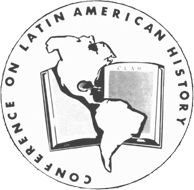CLAH Teaching Committee 2011 Roundtable: Teaching “Abroad”
CLAH Teaching Committee 2011 Roundtable: Teaching “Abroad”
The CLAH Teaching and Teaching Materials Committee roundtable for the January 2011 conference in Boston will focus on challenges involved in teaching “abroad,” both with North American scholars teaching in Latin America and Latin American scholars teaching in North America. This roundtable will be an opportunity to share experiences about what works, what doesn’t, and what lessons can be brought back to the “home” institution. How does teaching outside of our normal environment make us better instructors? How does such teaching inform broader efforts to promote North-South scholarly exchange via research and publication?
Chair: Marc Becker, Truman State University
Participant #1: Sueann Caulfield, University of Michigan: “Teaching gender history at the Universidade Federal da Bahia”
Participant #2: Maria Teresa Fernandez-Aceves, CIESAS-Occidente, Mexico: “Teaching Mexican History in an Interdisciplinary Research Center”
Abstract: This paper analyzes the differences, influences, trends in academic culture and teaching traditions prevailing in Mexico. It is based on a survey done with historians who work at the Centro de Investigaciones y Estudios Superiores en Antropología Social (CIESAS) and on a roundtable held in CIESAS-Occidente in September 2008 that debated the following questions: 1. What influences, trends and research topics in Mexican history have influenced your work? 2. What are the academic structures and cultures and international cultures that have influenced history in Mexico? 3. Are there variations in the theoretical use of terminology and historiography depending on the institution in which researchers were formed? 4. Is there a relationship of reciprocity in the circulation of knowledge between Anglo-Saxon countries, Europe, Latin America, in Mexico and its different regions? 5. Is it possible to achieve transnational exchanges at the level of national and regional discourses and practices of Cultural History, Social History and Gender History? 6. Is there an exchange between historians and historians? Who reads whom? 7. How do Cultural History, Social History and Gender History relate with other disciplines in the social sciences?
Participant #3: Jorge Nállim, University of Manitoba: “More Than Crossing Borders: Teaching Latin American History ‘Abroad’ ”
Abstract: Some critical differences between North American and Latin American universities must be considered for a successful teaching “abroad” experience across the North/Latin American divide. This presentation will focus on some of those differences related to the structure of university studies, use and availability of resources, and philosophical and historical concepts that inform university education.
Participant #4: Lara Putnam, University of Pittsburgh: “Teaching Against Exceptionalism: Histories of Central America, the Caribbean, and the Americas in a Costa Rican University”
Abstract: Like the United States, Costa Rica has a rich historiographic tradition within which claims to national exceptionalism take center stage. Beginning my teaching career at the Universidad de Costa Rica forced me to consider how each of various geographic frames mandated by course titles opened up specific avenues for critical questioning of exceptionalist claims, and closed off others. Attention to implicit hierarchies of citizenship, subnational regional disparities, and transnational ties all proved fertile points of entry for discussion. How to acknowledge inter-national contrasts without reifying “national” “cultures” remained–and remains–an ongoing challenge.
Participant #5: Tom Rogers, University of North Carolina: “International Teaching both at Home and Abroad: Consolidating Transnational Intellectual Community in the Classroom”
Abstract: Spending the spring 2010 semester teaching environmental history to graduate students at the Federal University of Pernambuco, I reflected on my experience teaching Brazilian exchange students at UNC Charlotte. Both contexts offered opportunities for shared learning and intellectual exchange and both offered challenges. In Charlotte, during our exchange program with three Brazilian universities, I tried to capitalize on the contrast between the Brazilians’ focused disciplinary preparation and their U.S. peers’ liberal arts background. In Pernambuco, at the same time that I accommodated myself to a new teaching environment, I had to mediate between different backgrounds again, this time between history students and
environmental studies students. These experiences have reinforced for me the value of teaching, both as a complement to my own research and writing agenda and as a means of maintaining an international scholarly community. My Charlotte colleagues and I are delighted to have helped several of our Brazilian students to pursue doctoral work in the U.S. In Pernambuco, I had a privileged view of student projects and approaches and my experience with Brazil’s next generation of historians will no doubt shape my own work and the way I ask
questions. My consistent presence here at the university also led to collaborations that would not have otherwise developed. These mutual influences, initiated in the classroom, will help to mitigate at least in small ways the division between Brazilian history and brasilianista history.
Participant #6: Victor Uribe, Florida International University: “Teaching students at public and highly politicized Latin American universities”
Abstract: It has always been a major challenge to reach out to students at public and highly politicized universities in Colombia. My experiences in Medellin, Colombia, have been varied. Many of the students I have encountered have firm opinions, hard to change. Others are a bit more open but still highly skeptical. Interestingly enough, they all appeared to be not only intensely political and outspoken, but generally bright and well trained. I have learned to listen much more than I was used to. However, this new skill does not necessarily help me much with the rather more passive students I face when I am back in the U.S.
Comment: Liz Hutchison, The University of New Mexico, and Audience
